CC052
Human Collagen Type II
liquid, 1 mg/mL, suitable for cell culture, used for gel formation
Synonym(s):
Collagen Type II, Human Collagen
About This Item
Recommended Products
product name
Human Collagen Type II,
biological source
human
Quality Level
Assay
90% (Human collagen type II)
form
liquid
manufacturer/tradename
Chemicon®
concentration
1 mg/mL
technique(s)
cell culture | mammalian: suitable
impurities
<0.5% Non-collagen proteins
<1% Human collagen type IV
<1% Human collagen type V
<10% Human collagen type I
<10% Human collagen type III
input
sample type pancreatic stem cell(s)
sample type: human embryonic stem cell(s)
sample type epithelial cells
sample type induced pluripotent stem cell(s)
sample type mesenchymal stem cell(s)
sample type hematopoietic stem cell(s)
sample type neural stem cell(s)
solubility
water: soluble at 20 °C
NCBI accession no.
UniProt accession no.
shipped in
dry ice
storage temp.
−20°C
Gene Information
human ... COL2A1(1280)
General description
Application
- as an extracellular matrix (ECM) protein in microarray analysis, to coat on nitrocellulose film slides for probing and detection experiments
- to study the role of Col2a1a in the neural crest during early eye development in zebrafish model of Stickler syndrome
- as a calibration standard in the quantification of collagen II levels in scaffolds using an enzyme-linked immunosorbent assay (ELISA)-based assay
Biochem/physiol Actions
Physical form
Storage and Stability
Legal Information
Disclaimer
Storage Class Code
12 - Non Combustible Liquids
WGK
WGK 1
Flash Point(F)
Not applicable
Flash Point(C)
Not applicable
Certificates of Analysis (COA)
Search for Certificates of Analysis (COA) by entering the products Lot/Batch Number. Lot and Batch Numbers can be found on a product’s label following the words ‘Lot’ or ‘Batch’.
Already Own This Product?
Find documentation for the products that you have recently purchased in the Document Library.
Customers Also Viewed
Articles
Extracellular matrix proteins such as laminin, collagen, and fibronectin can be used as cell attachment substrates in cell culture.
Extracellular matrix proteins such as laminin, collagen, and fibronectin can be used as cell attachment substrates in cell culture.
Extracellular matrix proteins such as laminin, collagen, and fibronectin can be used as cell attachment substrates in cell culture.
Extracellular matrix proteins such as laminin, collagen, and fibronectin can be used as cell attachment substrates in cell culture.
Protocols
This page covers the ECM coating protocols developed for four types of ECMs on Millicell®-CM inserts, Collagen Type 1, Fibronectin, Laminin, and Matrigel.
Our team of scientists has experience in all areas of research including Life Science, Material Science, Chemical Synthesis, Chromatography, Analytical and many others.
Contact Technical Service











